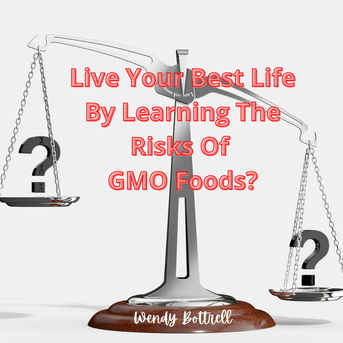Understanding the Risks of GMO Foods: A Vital Step Towards an Organic Lifestyle Explore the health risks associated with GMO foods and learn why it's essential to consider eliminating them from your diet. Delve into the potential health issues, environmental risks, and the importance of opting for organic, non-GMO alternatives for a healthier and more sustainable lifestyle. Join the conversation and share your thoughts on living your best life by learning about the risks of GMO foods. My journey to living an organic lifestyle began many years ago when I studied Holistic Lifestyle Coaching with the CHEK Institute. We learned that the toxins in GMO has been detrimental to our health. So, today we want to share you with why it might be important to consider eliminating GMO's from your diet. We have been discussing living your best life by eliminating toxins and enjoying the benefits of an organic lifestyle. We must take some time today to talk about learning the risks of GMO foods to truly live your best organic life. Be sure to share any ideas you have in the comments below and let us know how we can help you. GMO foods (genetically modified) are those that come from organisms whose DNA or genetic material has been altered in a way different from how it naturally occurs. The process of genetically modifying foods is referred to as gene technology or modern biotechnology. It has also been called recombinant DNA technology or genetic engineering at times. At the present moment foods considered GMO come primarily from plants. In theory, most genetically modified crops are altered to improve the yield of those crops via the introduction of resistance to plant disease or by increasing the tolerance of herbicides. Food producers have also seen reductions in food prices through improved yields and reliability which has increased the appeal of this method of production. Presently there is also work being done to derive genetically modified foods from microorganisms or animals that have been genetically modified. Other potential uses for genetic modification in the future that are being looked at might also include changing the nutrient content of food, reducing its allergenic potential, or improving the efficiency of food production systems (World Health Organization, 2019). The most common genetically modified foods include but are not limited to: - Fruits and Vegetables - Vegetable Oil - Papaya - Soy - Sugar Beets - Yellow Squash - Zucchinis These items are used to make popular food items such as milk (cows fed genetically modified soy products), tofu (GMO soybeans), cereals (corn and soy products), sweetened juices (corn and sugar beet-based sweeteners), carbonated soft drinks (high fructose corn syrup made from sugar beets), baby formula (GMO corn, soy, and sugar beets), and frozen foods (starch added from GM corn, as well as fats and oils from GM plants, citric acid from GM microorganisms) (Piedmont Healthcare, June 14). Health issues associated with the consumption of GMO food include but are not limited to infertility, insulin regulation issues, quicker ageing, immune problems, alterations in major organs, alterations in the gastrointestinal system, and hormonal imbalance and changes. The American Academy of Environmental Medicine notes that these and other adverse effects linked to the intake of GMO foods are more than a causal association. They note that the strength of association and consistency between GMOs and illness or disease has been adequately confirmed and outlined in numerous animal studies (Disabled World, 2013). There are also reported risks to the environment. A 2018 report in PNAS described changes to ecosystems that occur when food is genetically altered which can lead to chain reactions that have a larger impact over time. An example of this can be seen when an herbicide used to kill a certain pest eliminates the natural enemy of another pest. A response to this is that the pest rises in strength which leads farmers to increase their pesticide use. This increase then causes pesticide resistance and a new species of pesticide-resistant pests appear (Myers, 2011). Genetically modified foods pose a significant health risk and must actively be avoided as they are so readily accessible and available for consumption today. Taking measures to buy Non-GMO or what we now call organic real foods is a good strategy to reduce or eliminate the addition of GMOs to the diet, thereby mitigating potential negative health impacts. We recenlty wrote a blog post that might interest you here - Embrace the Transformative Magic of 30 Minutes Daily Walking We'd love to hear from you! Share your thoughts, ideas, or comments below, and let's continue to inspire each other on our paths to wellness. If you ever need guidance or support, don't hesitate to reach out. We're here to help you thrive every step of the way. Let's Build Health & Fitness - Join Our Newsletter Today! Sign Up Today! https://bit.ly/42Hf0aR Unlock Your Walking Potential with Our 7-Day PDF Course! Ready to conquer your walking goals and achieve remarkable milestones? Say goodbye to inconsistency and hello to success with our exclusive 7-day PDF course! Dive into the exact blueprint that empowered me to walk consistently for 12 months, accumulating over 3 million steps in a single year. If you've ever toyed with the idea of taking a step toward fitness, feel free to explore more at this link: https://wendyb.gumroad.com/l/tjibyg No pressure at all—just sharing in case it resonates with you. Let's make each step count together! References: Anilakumar, & Bawa. (2013). Genetically modified foods: safety, risks and public concerns—a review. PubMed Central (PMC). https://www.ncbi.nlm.nih.gov/pmc/articles/PMC3791249/ Disabled World. (2013, June 28). Genetically modified foods and health risks. https://www.disabled-world.com/fitness/nutrition/foodsecurity/gm-health-risks.php Myers, B. (2011, April 10). Risks & side effects of genetically modified food | Livestrong.com. LIVESTRONG.COM. https://www.livestrong.com/article/417880-risks-side-effects-of-genetically-modified-food/ Piedmont Healthcare. (June 14). Genetically modified foods: Helpful or harmful? | Piedmont healthcare. Piedmont Healthcare | 11 Hospitals and Over 550 Locations. https://www.piedmont.org/living-better/genetically-modified-foods-helpful-or-harmful World Health Organization. (2019, November 15). Food, genetically modified. WHO | World Health Organization. https://www.who.int/health-topics/food-gen
0 Comments
Leave a Reply. |
Archives
July 2024
Categories |










 RSS Feed
RSS Feed
